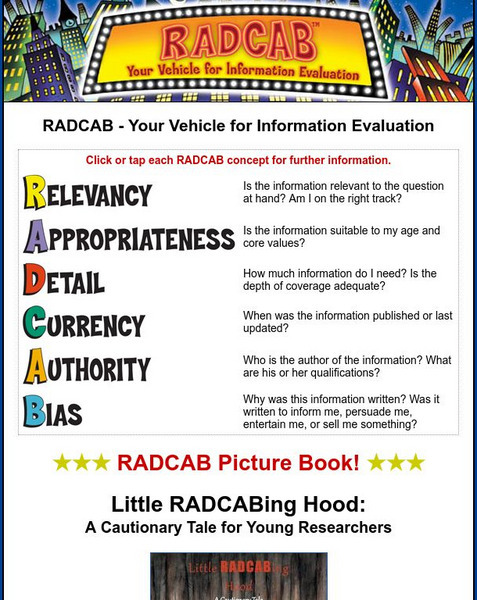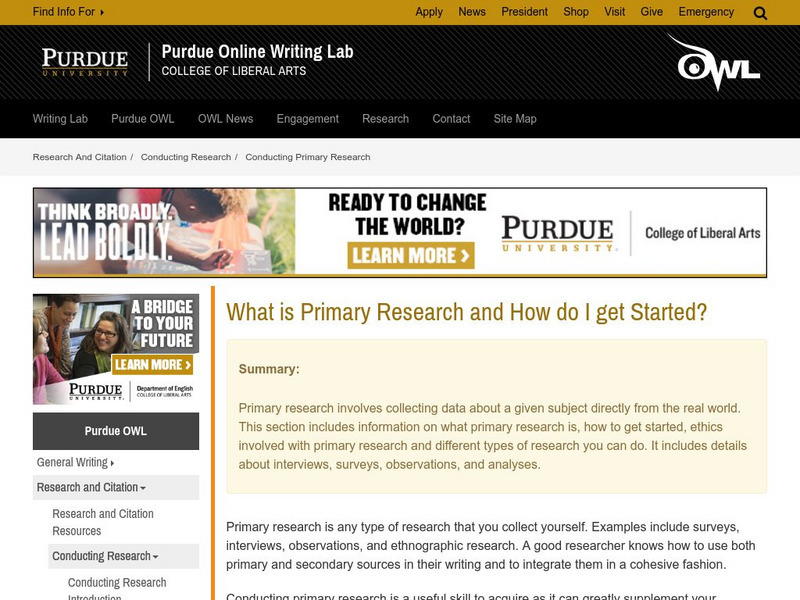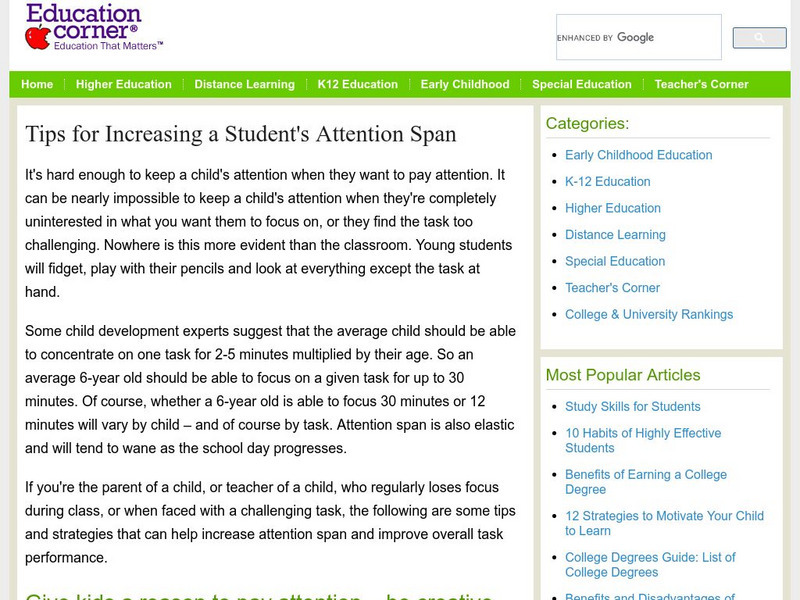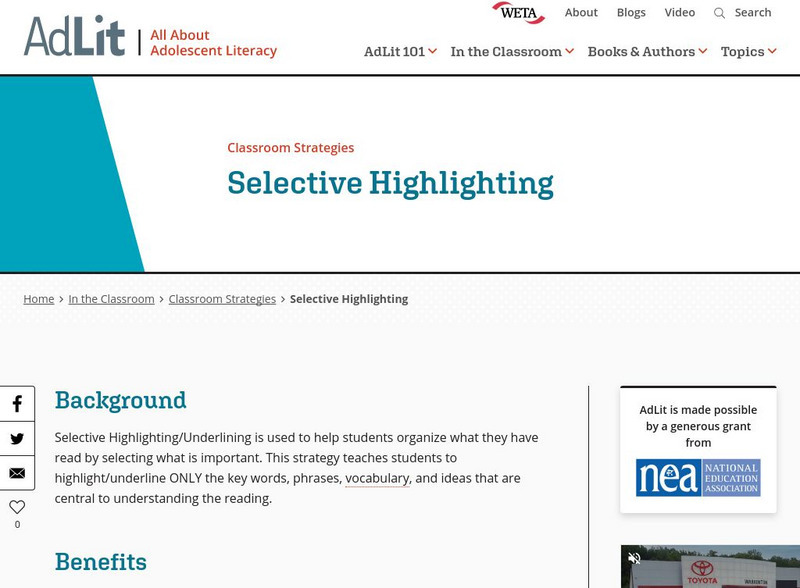TED Talks
Ted: Ted Ed: How False News Can Spread
In previous decades, most news with global reach came from several major newspapers and networks with the resources to gather information directly. The speed with which information spreads now, however, has created the ideal conditions...
Other
Radcab: Your Vehicle for Information Evaluation
How do you know you are using a trustworthy source when writing a research paper? Use this acronym for easy questions to ask yourself to make sure you have a reliable source. Click on each one for further details.
CommonLit
Common Lit: Units: 6th Grade Poetry Unit: Identity
Complete teaching unit for 6th Grade Poetry Unit: "Identity." Students will read 6 poems that speak to the theme of creating an identity. They will revisit the essential question: "How do we forge an identity?", read thematically-paired...
CommonLit
Common Lit: Units: 8th Grade Argumentative Writing Unit: Improving Society
Complete teaching unit for 8th Grade Argumentative Writing Unit: "Improving Society." Students will read six texts about problems in society. Throughout the unit, 8th graders will gather information from their readings in a graphic...
CommonLit
Common Lit: Text Sets: Psychology and the Mind
The mind has fascinated and mystified humans for millennia. Delve into the science behind the brain with these works on philosophy, foundational psychology, and scientific studies. This collection includes 61 Grade-Leveled texts (6-12)...
BBC
Bbc Skillswise: Fact or Opinion
As part of the BBC's Skillswise unit, this resource covers the basics of separating fact from opinion through a worksheet, a factsheet, and a quiz.
CommonLit
Common Lit: Themes: Education & Knowledge: What Is the Goal of Education?
This is a collection of Grade-Leveled texts (3-12) to address the question, "What is the goal of education?" Select a grade level and a collection of on grade-level reading passages on the topic comes up. [Free account registration...
The Washington Post
Washingtonpost: Rewriting the Rules
Washington Post article dealing with ethics and guidelines of journalists reporting hard news. Provides material for debate and discussion. Interesting article.
Online Writing Lab at Purdue University
Purdue University Owl: Primary Research
Learn the difference between primary and secondary research as well as some different types of primary sources that can be used when gathering research.
Online Writing Lab at Purdue University
Purdue University Owl: What Is Primary Research and How Do I Get Started?
Learn the difference types of primary sources and how to use them as a part of your research.
Other
Massey University: Vygotsky
An introduction to some of the basic concepts of Vygotskyean theory. Sections on higher and lower mental functions, intramental vs. intermental abilities, and the zone of proximal development.
Other
Education Corner: Tips for Increasing a Student's Attention Span
This article lists tips and strategies that can help increase attention span and improve overall task performance in the classroom.
Other
Psychology Today: Parenting: Decision Making
Decision making is one of the most important skills your children need to develop to become healthy and mature adults. This article gives tips on raising good decision-makers and reviews the process of decision-making.
Alabama Learning Exchange
Alex: The United States Supreme Court: Published Opinions
Students will read and analyze published opinions of the United States Supreme Court to determine the type of opinions issued by the court. Students will select a justice and attempt to determine that justice's ideology as they read the...
Alabama Learning Exchange
Alex: How to Cite Online Resources
After research in the Alabama Virtual Library, students will write a paragraph essay and use an online citation utility to create bibliographic citations for an online encyclopedia, an online magazine, and a print resource. Copying and...
Internet Encyclopedia of Philosophy
Internet Encyclopedia of Philosophy: John Dewey
Biography and thorough discussion of Dewey's thought, with bibliography at bottom from the Internet Encyclopedia of Philosophy. Divides his philosophy into theory of knowledge, metaphysics, ethics, and aesthetics, and then judges his...
Internet Encyclopedia of Philosophy
Internet Encyclopedia of Philosophy: The Epistemology of Perception
This site from the Internet Encyclopedia of Philosophy provides a well-written, easy to understand definition of perception, as well as small mention of some of those who first introduced the concept.
Internet Encyclopedia of Philosophy
Internet Encyclopedia of Philosophy: The Sophists
This site from the Internet Encyclopedia of Philosophy provides a good summary of the Sophists, their history and motives. Lists major figures.
Other
Central Michigan University: Website Research: Fake News
Critical appraisal tests like CRAAP and RADAR can also be used to evaluate the credibility of news websites and the stories they produce (which often go viral on social media). Here are some more resources to help you check! (CRAAP...
ReadWriteThink
Read Write Think: Inquiry on the Internet: Evaluating Web Pgs for Class Collection
A four-session lesson plan that leads to a class collection of resources is a solid introduction to both searching skills and evaluation. Could be used with any number of subject areas.
iCivics
I Civics: The Poll Picture (Infographic)
Use this infographic to show the process of surveying from pollster to prediction. Students will engage with the concept of sampling and gain a better understanding of the purpose of public opinion polls.
iCivics
I Civics: Texas v. Johnson (1989)
This mini-lesson covers the basics of the Supreme Court's decision that burning the American flag is a form of political speech protected by the First Amendment. Students learn about the First Amendment freedom of speech and the...
Joe Landsberger
Study Guides and Strategies: Problem Solving and Decision Making
Learn step-by-step problem solving skills with this free and user-friendly study guide. Integrate the strategies into your lesson plans or use the actual study guide to each your students about problem solving and decision making.
AdLit
Ad lit.org: Classroom Strategies: Selective Highlighting
Selective Highlighting/Underlining is used to help students organize what they have read by selecting what is important. This strategy teaches students to highlight/underline ONLY the key words, phrases, vocabulary, and ideas that are...















